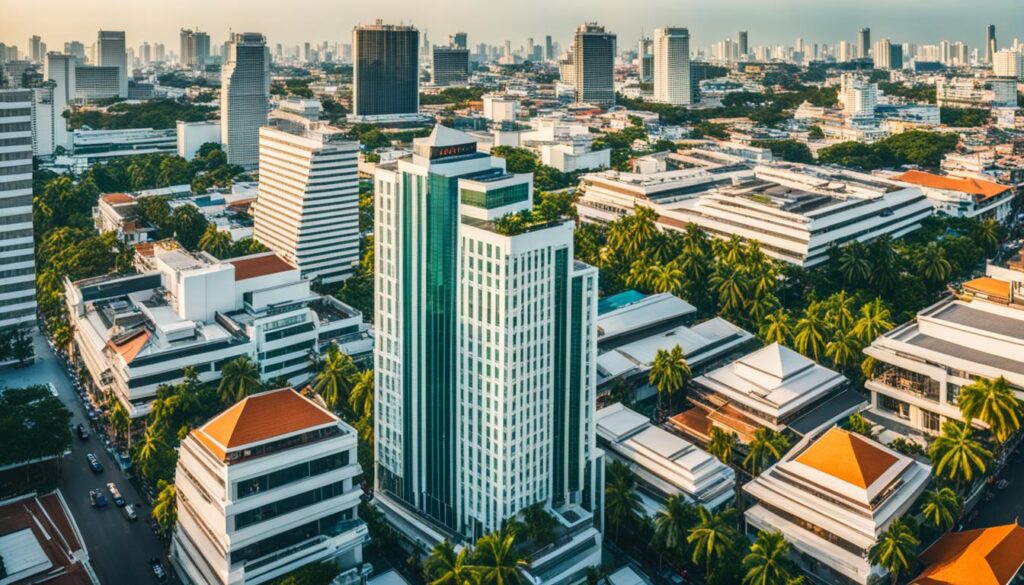Delving into the world of financing property in Thailand brings its own set of rules and rewards. This easy guide serves as the essential primer for anyone exploring the vibrant real estate loans Thailand landscape offers. From the bustling streets of Bangkok to tranquil beachfront havens, understanding the nuances of property financing options Thailand paves the way for a bounty of investment opportunities. Foreigners can unlock the door to property ownership in Thailand by satisfying conditions like securing stable employment within the country, acquiring Thai Permanent Resident status, or tying knots with a Thai national1.
Key Takeaways
- A range of financing options caters to expatriates and international investors.
- Understanding eligibilities, such as age and income, can influence your financing journey.
- Navigating the financial landscape requires familiarity with local banks and lending criteria.
- For a smoother financing experience, grasp the legal frameworks regarding property ownership.
- Specialized home loan options like UOB’s property loans consider a broad spectrum of applicants within specific parameters.
- Alternative financing avenues such as MBK Guarantee present advantageous terms for foreign buyers.
Thailand Property Market Overview: What Lures Expats?
Exploring the tapestry of Thailand’s appeal to expatriates involves unraveling the factors from economic vitality to cultural richness. Ranking impressively at number 27 in the World Bank’s Doing Business Report in 2018, the country has proven its mettle in providing a conducive environment for business and investment2. This, in combination with its position as 36 out of 99 on the Corruption Perceptions Index, signals a growing confidence in Thailand’s governance and economic frameworks2. The parallel rise of property financing Bangkok and financing options for Thailand property is a testament to this trust.
The Charm of Living in Thailand
More than just economic metrics, the alluring landscapes and the throbbing heart of Thai culture offer an irresistible pull for those seeking not just a home, but an experience. Out of 190 countries, Thailand’s inviting business landscape is crystallized by its Global Innovation Index standing, where it ranks 44, highlighting the nation’s thrust towards modernity and inventiveness2. This spirit translates into various financing options for Thailand property, making the dream of living amidst its charm a tangible reality for many.
Growth of the Expat Community in Thailand
The strength of Thailand’s Gross National Income (GNI) per capita, recorded at USD 5,950 in 2017, underscores the economic steadiness that expats have come to rely on2. Coupled with a vast U.S. Foreign Direct Investment (FDI) in Thailand, amounting to USD 15,006 million in the same year, the expat community is bolstered by a robust financial undercurrent2. Such financial health has paved the way for extensive property financing Bangkok, cementing the city as a beacon for expatriates seeking a mix of urban luxury and tropical tranquility.
Banking and Finance Essentials for Expats in Thailand
Understanding the essentials of banking and finance is the bedrock of securing Thai property investment loans. To commence your journey towards funding for Thai real estate, establishing a firm banking foothold is imperative. Opening a bank account, a seemingly simple task, can be nuanced for foreigners due to regulatory requirements and eligibility criteria. This account serves as a crucial linchpin in demonstrating financial stability to lenders and managing your property investment efficiently.

Credit options further expand the capacity of expats to navigate the property market. Obtaining a credit card from a Thai financial institution not only facilitates easier transactions but also aids in building a credit history in the country—which is often considered by lenders when approving loans for real estate investment. Ensuring you are prudent with your credit will pave the way for better financial relations and, consequently, improved access to funding for Thai real estate.
As part of your financial toolkit, awareness of local real estate loan specifics can make a significant difference. Interest rates, repayment schedules, and initial down payment requirements vary widely among Thai banks and lenders. Vigilant expats must compare these factors to secure the most favorable terms for their property investment.
Lastly, always be abreast of the legal landscape. Changes in regulations, such as how Oracle JDK 8’s license evolved in April 2019, allowing certain uses at no charge yet with notable restrictions3, exemplify the dynamic nature of financial and software compliance. Similar fluctuations in the banking and property sectors could impact your investment, thus staying informed is not discretionary—it’s essential.
Tackling the essentials of banking and finance in Thailand with diligence will not only streamline the process of securing a property investment loan but will also instill confidence as you navigate through the intricacies of the Thai real estate market.
Eligibility Criteria for Securing Property Loans in Thailand
For expatriates dreaming of owning a piece of tropical paradise, understanding the eligibility criteria for financing a mortgage for property in Thailand is the first step towards achieving property ownership. Thai real estate laws accommodate foreign interests, providing property financing options in Thailand that cater to various backgrounds and financial standings.

To begin with, one must take into account the work permit conditions governing expats. Let’s delve into these requirements and how they might influence your prospects for obtaining a mortgage.
Work Permit Requirements for Expats
Securing the relevant documents, such as a valid work permit, is crucial for any expat looking to explore property financing options in Thailand. This work permit acts as a testament to your legal status in the country and is often a prerequisite for lenders considering your loan application.
The Influence of Permanent Residency and Relationships
Beyond this, being a permanent resident or having a Thai spouse can significantly sway the outcome of your mortgage application. Relationships and residency status are given substantial weight, potentially offering more favorable terms or access to certain property financing options in Thailand.
Understanding the Credit Score and Income Thresholds
A robust credit history and proving a stable income stream are also influential factors. Lenders meticulously review these criteria to assess risk and your capacity to sustain mortgage payments over time. Expats must therefore maintain a healthy credit score and income level to position themselves as eligible candidates for a mortgage for property in Thailand.
Overall, the blend of legal documentation, residential status, financial history, and income stability forms a comprehensive picture for lenders to gauge your suitability for a property loan. By familiarizing oneself with these components, expats significantly improve their chances of acquiring their ideal property in Thailand with the right financing arrangement.
It’s important to note that the broader financial landscape in Thailand reflects a supportive approach to financing. In 2020, the Thai Business Collateral Act enabled more flexible collateral registrations, including non-physical assets like intellectual property4. Furthermore, the Bank of Thailand’s innovative regulations and the SEC’s private placement initiatives signify a responsive financial system willing to accommodate diverse property financing needs4.
Types of Properties Expats Can Purchase in Thailand
Exploring options for overseas property finance in Thailand requires a deep understanding of what property types are available for foreign investment. While outright land ownership may be out of bounds for expats, there is a wealth of opportunities when it comes to purchasing condos, villas, and townhouses within legal frameworks designed to promote foreign investment while safeguarding local interest.
For those considering financing property in Bangkok, the city’s property landscape offers versatility and promise. Up to 73% of Thais own their homes, reflective of a vibrant domestic market5, with a significant share of 72.3% being detached houses5. However, for expats, the narrative shifts; in areas like Bangkok, condominiums and apartments become a focal point, capturing the interest of foreign investors thanks to their strategic location, amenities, and expat-oriented designs5.
A surge in foreign investment, notably from China, has been observed despite a slowdown in Bangkok’s residential sales5. Bangkok’s allure, with its international schools and robust expat community, continues to reinforce its reputation as an expat haven. Contrastingly, properties in Phuket offer a more cost-effective avenue compared to Bangkok, yet it’s the upscale developments that are pushing up the rental market, making it a hotspot for those eyeing holiday rentals or buy-to-let properties5.
Financially, expats looking at financing property in Bangkok will encounter a mix of fees, including a transfer fee of 2% of the property value, which, along with stamp duty and legal fees, is conventionally shouldered by the seller5. With fixed-rate and variable-rate mortgages on the table, and international banks like UOB, ICBC, and HSBC often more amenable to lending to foreigners, the pursuit of property in Thailand becomes a tangible goal for expats5.

- Condominiums are the preferred choice for expats in urban areas, thanks to convenience and a sense of community5.
- Villas and townhouses are accessible through various ownership structures, catering to those seeking a more homely abode.
- Securing financial aid from international banks familiar with expat clients can streamline the overseas property finance Thailand process.
As ownership statistics show, while a mere 57% of Thai millennials can afford to own their homes due to escalating prices and cultural trends5, the market has adapted to keep the dream of homeownership alive for expats through innovative solutions and international financing opportunities.
Financing Property in Thailand: Key Conditions and Options
In Thailand, the pursuit of financing property is intertwined with a myriad of key conditions and fiscal levers, all of which merit crucial consideration for the prospective buyer. The landscape of property financing options Thailand offers is diverse and reflects unique opportunities and constraints for both locals and expatriates alike.
For a significant majority of Thai residents, totaling 73%, home ownership has been achieved, a feat increasingly facilitated through financing property in Thailand, representing a solid foundation for the housing market6. It contrasts with the United States, where mortgages make up over 70% of household debt, compared to approximately 30.9% in Thailand6.
International Property Loans: UOB and Its Offerings
The international banking institution UOB has carved out a niche in offering robust financing platforms for expatriates keen on investing in Thai real estate. With tailored solutions that consider loan-to-value (LTV) ratios, commonly up to 50% of a Bangkok property’s value6, UOB’s offerings resonate with the aspirations of many international buyers.
Mortgages for Couples: Contractual Nuances for Foreigners with Thai Spouses
Foreigners married to Thai nationals encounter a unique set of contractual nuances when obtaining mortgages, reflective of intricate local legislation. In light of recent policy changes, Thai banks now extend loans up to 80-90% of a property’s value for Thai nationals, whilst expatriates typically secure 50-70% financing6.
MBK Guarantee: A Foreigner-Friendly Option
Foreign national investors encounter a welcoming option with MBK Guarantee, providing property loans up to 50% of a Bangkok condo’s value6. Moreover, the fixed-rate mortgages available in Thailand generally last around three years, adapting to the pace of economic flux6.
Among global expatriates, Thailand’s mortgage interest rates, which orbit around 8% and escalate to as high as 12% for condominiums6, remain a critical facet to consider. This compares to Thai banks’ hybrid variable-rate mortgages, offering lengthier tenures of up to 15 years6, thereby providing a flexible framework for long-term financial planning.
The Government Housing Bank (GHB) plays a pivotal role in the tapestry of Thai home finance, underwriting approximately 34% of mortgages nationwide6. This direct involvement underpins a structured approach to enabling property ownership within the kingdom, culminating in systemic stability in housing finance.
It is paramount for expatriates and locals alike to navigate the contours of Thailand’s property financing milieu with perspicuity, acknowledging the dynamic interplay of interest rates, LTV ratios, and institutional frameworks to secure the most propitious outcomes.
Realities of Mortgages and Loans for Thailand Expats: Comparing Institutions
Understanding the intricacies of real estate loans Thailand and property financing Bangkok is essential for expatriates navigating the local market. A key aspect to consider is how financial institutions in Thailand define SMEs, which causes significant variation in loan accessibility for businesses, including those owned by expatriates. It’s important to note that such definitions can range from sales under B500 million to credit lines less than B200 million, directly influencing the terms of financing.

Thai SMEs—which form the backbone of the country, accounting for 99.2% of business establishments and a substantial 79.1% of employment—face hurdles in accessing formal financing due to these non-standard definitions7. This is despite them representing 37.5% of the GDP, with manufacturing SMEs alone contributing 19.6% of business establishments, 27.1% of total employment, and 11.6% of GDP. Therefore, expat entrepreneurs looking to secure property financing in Bangkok may encounter similar challenges.
While financial institutions utilize collateral-based lending and require audited financial statements to reduce risks, most banks diverge from the national SME definition for their lending policies. This discrepancy creates an uneven playing field for expats seeking real estate loans in Thailand, where the size of an enterprise could steer the success in obtaining financial assistance.
Interestingly, the export and technological innovation potential of larger SMEs is not lost on the lending institutions, suggestive of a superior performance compared to their smaller counterparts. Despite this, external finance-seeking behaviors are low among Thai manufacturing SMEs, which is counterintuitive given the potential for enhancing technical efficiency and export performance through such funding.
| Financial Institution | Definition of SME | Impact on Loan Accessibility |
|---|---|---|
| Bank A | Sales < B500 million | Varied loan terms |
| Bank B | Credit line < B200 million | Differential access to finance |
| Specialized Financial Institution | National SME Definition | Consistent support for SMEs |
In light of these findings, expatriates engaging with the Thai market must diligently assess each institution’s lending policy and its implications for securing property or business loans. Engaging local financial advisors or institutions with transparent policies aligned with national definitions could substantially ease the financing process for prospective real estate investors and business owners alike.
Conclusion
As we conclude our guide on financing options for Thailand property, it’s clear that understanding the financial landscape is paramount. With Thailand’s significant increases in ease of doing business—evidenced by its ranking of 21st out of 190 countries in the World Bank’s Doing Business Report 20198—and the steps taken to reduce the time to start a business from 29 days to a mere 6 days, Thailand presents an attractive investment environment for property financing8. Moreover, the country’s Global Innovation Index ranking of 44th out of 131 countries8 underscores its growth trajectory, further enticing investors and expats alike.
The robust increase in U.S. Foreign Direct Investment, recorded at USD 17,738 million in 20198, is a testament to the fertile ground Thailand offers for international investors. However, one must not overlook the restrictions on foreign ownership in key sectors8 or the lack of a national security screening mechanism for investments8, which, instead, favors a focus on incentives for preferred areas like high-technology industries. Therefore, while property financing options Thailand provides are manifold, due diligence and professional advice are indispensable.
To discover more about the incentives and regulations influencing Thailand’s investment climate, examine the Investment Climate Statements provided by the U.S. Department of State. Finalizing, seizing the chance to secure a property in this culturally rich and economically thriving nation requires a blend of insights and strategic planning. The opportunities are ripe for those ready to navigate the exciting realm of property ownership in Thailand, with its promise of both profitability and personal fulfillment.
FAQ
Can foreigners finance property in Thailand?
Yes, foreigners can finance property in Thailand. There are financing options available such as real estate loans and mortgages specifically designed for expats.
What are the benefits of living in Thailand?
Thailand offers beautiful landscapes, a vibrant culture, and a welcoming community. It has become an attractive destination for expats looking to invest in property.
What are the banking and finance essentials for expats in Thailand?
Expats in Thailand should understand the process of opening a bank account, options for obtaining credit cards, and important financial considerations for property financing.
What are the eligibility criteria for securing property loans in Thailand?
Eligibility criteria for property loans in Thailand include work permit requirements, the influence of permanent residency and relationships, and credit score and income thresholds.
What types of properties can expats purchase in Thailand?
While foreigners cannot outrightly own land in Thailand, they can purchase condos, villas, and townhouses as long as they comply with certain ownership regulations.
What are the key conditions and options for financing property in Thailand?
Expats have access to international property loans offered by banks like UOB, mortgages with contractual nuances for foreigners with Thai spouses, and foreigner-friendly financing options like MBK Guarantee.
Which institutions offer mortgages and loans for expats in Thailand?
There are various institutions offering mortgages and loans for expats in Thailand. By comparing interest rates, repayment periods, and required down payments, you can choose the best option for you.
Source Links
- https://propertyscout.co.th/en/service/can-foreigners-get-loans-in-thailand/
- https://www.state.gov/reports/2019-investment-climate-statements/thailand/
- https://www.oracle.com/java/technologies/javase-jdk11-downloads.html
- https://www.oecd-ilibrary.org/sites/b854dc2c-en/index.html?itemId=/content/component/b854dc2c-en
- https://www.expatica.com/th/house/housing/thailand-real-estate-2172900/
- https://www.expatica.com/th/house/housing/mortgage-thailand-2172911/
- https://www.adb.org/sites/default/files/publication/185285/adbi-wp576.pdf
- https://www.state.gov/reports/2021-investment-climate-statements/thailand/
Comments